100 Film Favorites – #28: Cast Away
(Robert Zemeckis, 2000)
A word of preface: From 2010-2012, my fellow members of the William & Mary Wind Symphony elected me “Best Person to be Stranded With on a Desert Island” in three consecutive years of band superlatives. I’m not exactly sure why; perhaps I exude a mysterious air of crisis preparedness. But the fact remains – my peers apparently consider me well-qualified to comment on matters of desert island survival. So here goes.
Cast Away stars Tom Hanks as Chuck Noland, a Federal Express manager who travels the world, training international Fed Ex branches to run more efficiently and punctually. As such, he is driven by the clock at all times. “We cannot allow ourselves,” he tells a crowded Siberian mailroom, “to commit the sin of losing track of time.”
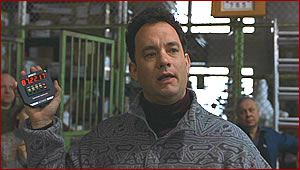
Chuck’s busy schedule interferes with his personal life, and he struggles to find an opportune time to propose to his longtime girlfriend, Kelly (Helen Hunt). At Christmas, Chuck is pulled away from Kelly’s side once more by the insistent buzz of his pager (ah, the late 90s, the last throes of the beeper’s storied life). Chuck has been summoned to address a Fed Ex branch in Malaysia. Kelly reluctantly drives him to the airport, and as he steps out of the car, Chuck promises to “be right back.”
That doesn’t quite work out. While flying through a terrible storm, the engines cut out and Chuck’s plane plunges into the Pacific Ocean. He just manages to escape the wreckage, grabbing hold of an inflatable life-raft as it floats free of the shredded fuselage. Chuck clings to the raft throughout the night, and awakens in the morning to find himself deposited on the shore of a tiny, remote, and uninhabited island (really uninhabited – no mammals, no insects, nothing). Suddenly, Chuck’s rigid schedule no longer means anything. He has all the time in the world, with nothing to do but survive.
This is easier said than done. For supplies, Chuck relies on an assortment of Fed Ex packages that wash ashore from the crash site (along with the corpse of the pilot, whom Chuck buries). These packages include a variety of goods: A pair of ice skates, a stack of VHS tapes, a lacy dress, etc. One package, a box emblazoned with stylized wings, Chuck decides not to open.
After gathering this hodgepodge of equipment, Chuck gets down to the business of surviving. The meat of the movie consists of Tom Hanks experimenting with different ways of using his supplies, largely “unessential” items, to help provide him with the necessities of life. For instance, he fashions dress-lace into a rudimentary fishing net. Un-spooling the video tapes provides him with makeshift rope. Chuck lashes an ice skate to a stick to make an axe, with which he is finally able to open coconuts, the one food source abundant on the island (a great scene reveals that fresh coconuts are much harder to open than Gilligan would have us believe).
One necessity Chuck must create for himself is fire, a task which proves daunting for some time. In one attempt, he accidentally gouges his hand on a log. Seized by a fit of rage, Chuck grabs hold of another package with his bleeding hand and hurls it across the beach. The package, a Wilson-brand volleyball, retains the image of Chuck’s bloody handprint on its surface.
Gradually, Chuck develops strategies to provide himself with all he needs to survive. He makes fire, procures water and shelter, and slowly learns the ins and out of capturing fish and crabs, the only animals which come anywhere near the island. He even practices improvised dentistry on himself to remove an impacted tooth. All the while, Chuck is driven to survive by two symbolic objects: A pocketwatch with a picture of Kelly inside, and the unopened winged package, awaiting delivery.
The film jumps forward four years, and we find Chuck now thoroughly Jumanji-fied. Sporting a loincloth and a truly impressive beard, he has become an expert hunter and all-around survivalist. Chuck’s only companion, with whom he converses frequently, is Wilson, the volleyball, a lopsided smile now etched in his bloody handprint “face.” Through their conversations, we learn that Chuck has accepted that he will never be rescued, and has attempted suicide at least once over the course of his 1,500 days on the island.
Then, one day, the tide brings in a section of wall from a plastic port-a-potty. Seeing a chance of escape, Chuck sets about building a raft, with the plastic wall serving as a sail. He finally crests the waves which had foiled his previous attempts, and Chuck sails away across the vast Pacific. On their oceanic journey, Wilson becomes lost when the raft is damaged. Chuck is distraught, and allows himself to merely drift along at sea. After an unspecified time spent baking in the sun and the ocean air, he is discovered and rescued by a passing cargo ship.
Soon, Chuck is returned to civilization, but his feelings of isolation endure. He feels baffled and unfulfilled by the ease with which he can now find food and shelter. He thoughtfully regards the almost foreign concept of ice, and spends long periods simply switching the lights on and off – a process far simpler than making fire. But Chuck’s biggest shock comes when he learns that Kelly has “moved on” and married another man, with whom she now has children.
Now, if I had spent four years surviving solely on the hope that I might one day be with the woman I loved again, I don’t think I could be counted on to show nearly as much restraint as Chuck does. Me, I probably would have put my half-decade of caveman training to use on whatever interloper happened to be horning in on my intended. But instead of pulling an Odysseus, Chuck sadly accepts that he too must move on with his life. He delivers a great speech about the matter, which makes up somewhat for the lack of a wildman revenge scene:
“All my logic said that I would never see this place again. But I stayed alive. I kept breathing. And one day my logic was proven all wrong because the tide came in, and gave me a sail. And now, here I am. I’m back. In Memphis, talking to you. I have ice in my glass… And I’ve lost her all over again. I’m so sad that I don’t have Kelly. But I’m so grateful that she was with me on that island. And I know what I have to do now. I gotta keep breathing. Because tomorrow the sun will rise. Who knows what the tide could bring?”
The film ends with Chuck finally delivering the winged box, on which he places a note saying that the package “saved my life.” At a crossroads, he encounters a woman whose truck bears the same wing logo. As she drives away, Chuck peers pensively down each fork of the crossroads, finally gazing in the direction the enigmatic woman departed. For Chuck Noland, there is still life to live. Tomorrow the sun will rise.
Cast Away is a great film because, like Jurassic Park, it delivers on a simple but compelling premise. Here, it’s “a typical, middle-class guy is stranded on a desert island and has to survive.” The drama of the film is Chuck’s struggle to accomplish once-simple tasks with the resources at his disposal, honing his mind and body along the way. This story is told largely without dialogue. Only a handful of skilled actors can really pull off what is essentially a “last man on earth” role, remaining interesting and engaging despite being virtually the only character onscreen. Tom Hanks is one such actor. You really empathize as he pieces together his survival strategy through trial and error, suffering more than a few bruises and gouges along the way as he encounters new obstacles.
A large part of the movie’s effectiveness can also be attributed to its soundtrack. From the moment the plane goes down, no background music is heard. The island itself is devoid of life, so no insect or “jungle animal” noises are heard. The only sound Chuck hears for four years is the ceaseless breaking of waves on his beach, along with the occasional thud of a fallen coconut. The lack of background music is fairly unusual for a contemporary feature film, but this silence does an amazing job of conveying Chuck’s feeling of isolation and loneliness. And the instant that Chuck crests the waves holding him in the island’s pull, background music swells anew, making itself known for the first time in 48 months.
Cast Away is not only a fine example of nonverbal storytelling starring an accomplished and engaging lead actor. It also offers a crash course on some useful strategies for utilizing your surroundings to best survive on that most lonely and desolate setting in the collective imagination, the desert island. And believe me, I know what I’m talking about. After all, I AM a thrice-certified Desert Island Expert.
Tidbits:
Regular old English-language Cast Away too mainstream for you? What if you went with the version dubbed in German? Still too mainstream? Then maybe you should check out this Pogo-style remix of the German-dubbed Cast Away, “Ich Habe Feuer Gemacht” (“I Have Made Fire”):
—
Brian Terrill is the host of television show Count Gauntly’s Horrors from the Public Domain. You can keep up with Brian’s 100 Film Favorites countdown here.




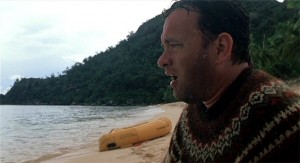
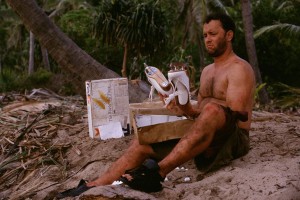
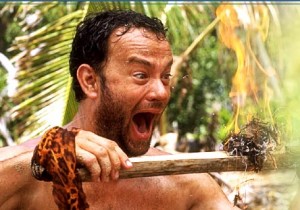
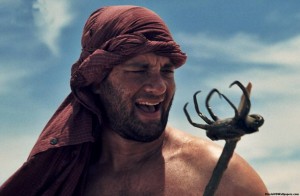
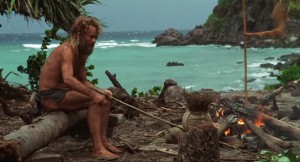
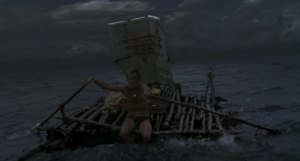
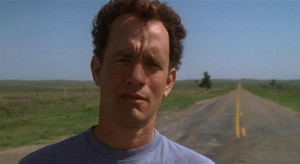

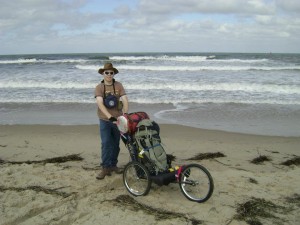



Pingback: Tom Hanks: 10 Things You Didn’t Know! - BlogRope